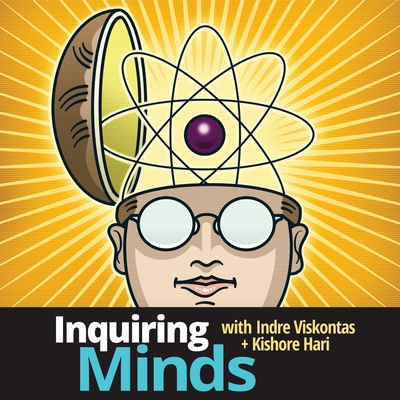Each week Inquiring Minds brings you a new, in-depth exploration of the places where science, politics, and society collide. We’re committed to the idea that making an effort to understand the world around you though science and critical thinking can benefit everyone—and lead to better decisions. We endeavor to find out what’s true, what’s left to discover, and why it all matters with weekly coverage of the latest headlines and probing discussions with leading scientists and thinkers. Inquiring Minds is hosted by neuroscientist and musician Indre Viskontas and science educator Kishore Hari. It’s produced by Adam Isaak in partnership with Climate Desk, a journalistic collaboration dedicated to exploring the impact of a changing climate and consisting of The Atlantic, Center for Investigative Reporting, Grist, The Guardian, The Huffington Post Mother Jones, Slate, and Wired. Our music is provided by award-winning producer Rhian Sheehan. RSS: http://feeds.feedburner.com/inquiring-minds iTunes: https://itunes.apple.com/us/podcast/inquiring-minds/id711675943 Stitcher: http://www.stitcher.com/podcast/inquiring-minds
https://soundcloud.com/inquiringminds
33 David Amodio - The Science of Prejudice
When the audio of LA Clippers owner Donald Sterling telling his girlfriend not to "bring black people" to his team's games hit the Internet, the condemnations were immediate. It was clear to all that Sterling was a racist, and the punishment was swift: the NBA banned him for life. It was, you might say, a pretty straightforward case. When you take a look at the emerging science of what motivates people to behave in a racist or prejudiced way, though, matters quickly grow complicated. In fact, if there's one cornerstone finding when it comes to the psychological underpinnings of prejudice, it's that actual out-and-out or "explicit" racists—like Sterling—are just one part of the story. Perhaps far more common are cases of so-called "implicit" prejudice, where people harbor subconscious biases, of which they may not even be aware, but that come out in controlled psychology experiments. Much of the time, these are not the sort of people whom we would normally think of as racists. "They might say they think it's wrong to be prejudiced," explains New York University neuroscientist David Amodio, an expert on the psychology of intergroup bias, on this week’s episode. Amodio says that white participants in his studies "might write down on a questionnaire that they are positive in their attitudes about black people…but when you give them a behavioral measure, to how they respond to pictures of black people, compared with white people, that's where we start to see the effects come out." On the show this week we talk to Amodio about his research on the neuroscience of prejudice, its implications, and what we can do about it. This episode of also features a discussion of how scientists turned to a group of video gamers to help solve a complex problem involving how the human retina detects motion, and of the release of the groundbreaking National Climate Assessment. iTunes: itunes.apple.com/us/podcast/inquiring-minds/id711675943 RSS: feeds.feedburner.com/inquiring-minds Stitcher: stitcher.com/podcast/inquiring-minds
